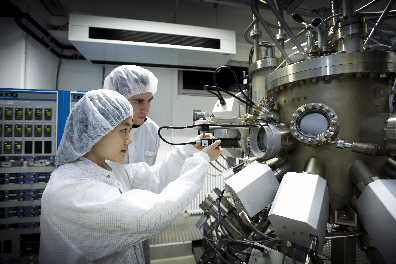Attracting the best scientists from all over the world and offering them excellent working conditions. This is KIT’s objective also to set yardsticks in the promotion of young scientists. Presently, a number of young “high potentials” are working at KIT and heading research projects. They established the Young Investigator Network (YIN) as a platform to democratically represent their interests. This type of self-administrated network is unique in Germany. On May 12, 16.30 to 19.00 hrs, at the Audimax (Strasse am Forum 1), YIN will pre-sent itself to the public for the first time.
The scientists of the network invited the head of the appointment commission of ETH Zurich, Dr. Thomas Eichenberger, as the main speaker of the YIN foundation ceremony. He will talk about career perspectives of young scientists and introduce the assistant professor system established by ETH Zurich. The following discussion will be joined by the Head of the Program and Infrastructure Funding Section of DFG, Dr. Beate Konze-Thomas, the Senior Vice President of BASF, Professor Dieter Jahn, who is responsible for science relations and innovation management at BASF, Professor Eberhard Umbach, KIT Executive Board, as well as by Dr. Anke-Susanne Müller, Head of a Helmholtz young investigator group at KIT. The discussion will be moderated by Martin Spiewak from the ZEIT.
Journalists are cordially invited to join this event. For registration, complete the form enclosed.
The young investigator network (YIN) is a central element of the promotion of young scientists in the concept for the future of the excellence initiative. The YIN shall represent the concerns of young scientists internally to the executive board and bodies, but also externally to political institutions and the public. “In our self-administrated network, we have the possibility of supporting each other actively by consulting colleagues. To rapidly implement our ideas and interests, we are acting jointly in spite of the great variety of persons and topics and contributing to shaping the KIT. In this way, every individual young investigator group and the network in general are strengthened and visibility is enhanced”, underlines Dr. Timo Mappes, spokesman of the YIN.
The YIN is presently comprising the 45 heads of the scientifically independent young investigator groups of KIT, which are funded among others by the excellence initiative, the Deutsche Forschungsgemeinschaft (DFG, German Research Foundation) or the Helmholtz Association of National Research Centers (HGF). In addition, junior professors have joined the network.
The YIN scientists are responsible for research projects in various fields, often in cooperation with industry. While heading working groups, they are responsible for staff and contribute to teaching. The YIN is financed from funds of the excellence initiative and the KIT Research Department.
Members of the network are offered an extensive training program by the KIT to qualify them for future management tasks in research and education. Workshops on university education, project management, and staff management are organized. In addition, YIN has developed an extensive coaching and mentoring program in cooperation with “kww – Die Wissenschaftliche Weiterbildung der Universität Karlsruhe” (kww – scientific advanced training of Universität Karlsruhe).
Program of the YIN Foundation Ceremony
on May 12, 16.30 to 19.00 hrs
Welcome and Moderation
Martin Spiewak
Editor of the weekly paper “Die Zeit”
Welcome Addresses
Dr. Beate Konze-Thomas,
Head of the Program and Infrastructure Funding Section of DFG
Prof. Dr. Detlef Löhe,
Vice-President for Research, Universität Karlsruhe (TH)
Presentation of the Young Investigator Network (YIN)
Dr. Timo Mappes,
Spokesman of the YIN
Invited Presentation “Career Perspectives of Young Scientists – the Assistant Professor System of ETH Zurich”
Dr. Thomas Eichenberger,
Head of the Appointment Commission of ETH Zurich
Podium Discussion “Perspectives of Young Leading Scientists Today?”
Dr. Thomas Eichenberger,
Head of the Appointment Commission of ETH Zurich
Prof. Dr. Dieter Jahn,
Senior Vice President, Science Relations & Innovation Management BASF
Dr. Beate Konze-Thomas,
Head of the Program and Infrastructure Funding Section of DFG
Dr. Anke-Susanne Müller,
Head of a Helmholtz Young Investigator Group at the KIT
Prof. Dr. Eberhard Umbach,
KIT Executive Board
Music: Band TriTones
Buffet
Poster session of the young investigator groups
The Karlsruhe Institute of Technology (KIT) is the merger of the Forschungszentrum Karlsruhe, member of the Helmholtz Asso-ciation, and the Universität Karlsruhe. This merger will give rise to an institution of internationally excellent research and teach-ing in natural and engineering sciences. In total, the KIT has 8000 employees and an annual budget of 700 million Euros. The KIT focuses on the knowledge triangle of research – teaching – innovation.
The Karlsruhe institution is a leading European energy research center and plays a visible role in nanosciences worldwide. KIT sets new standards in teaching and promotion of young scien-tists and attracts top scientists from all over the world. More-over, KIT is a leading innovation partner of industry.

